Is This the Way to Talk About Maxine Waters?
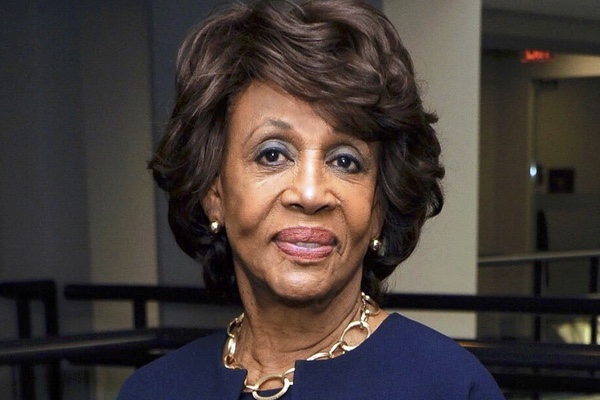
Like many people, I have watched over the past few weeks as women have been attacked from all sides. This is, unfortunately, nothing new. Yet, what has occurred over the course of Brett Kavanaugh’s nomination process has been particularly painful for many women. As Dr. Christine Blasey Ford, Deborah Ramirez, and Julie Swetnick have faced an all-out assault for daring to ask for accountability and justice, I watched as women I knew had their own pasts, their own trauma, brought to the surface. I watched, and tried to listen, to the women around me as they told their stories.
It was in this atmosphere that I checked Twitter on Saturday, September 30, and saw an exchange between two historians that I found disturbing. It began with Dr. Brian Rosenwald criticizing the “extremist” and “incendiary rhetoric” of Congresswoman Maxine Waters, who was apparently embarrassing the Democratic Party. Dr. Rosenwald called for liberals like himself to “police” their side. All of this took place in dialogue with another person on Twitter, who challenged his likening of Waters to Republicans like Steve King and Jim Jordan. After several tweets, Dr. Keri Leigh Merritt joined the conversation by echoing a previous point and highlighting the privilege both Dr. Rosenwald and herself derived from being white. Dr. Merritt continued, asserting (rightly so) how the civility argument being employed by Dr. Rosenwald was steeped in white male privilege.
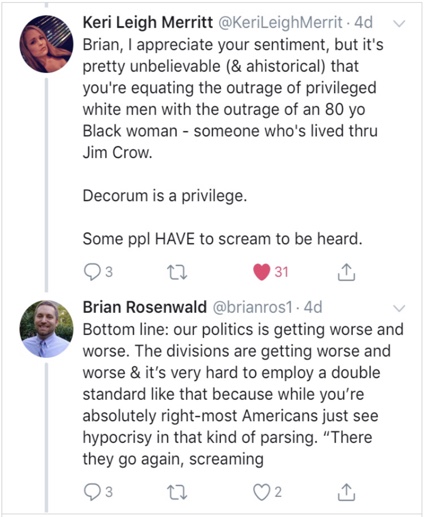
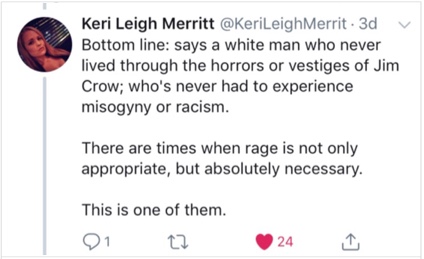
And so he responded as follows:
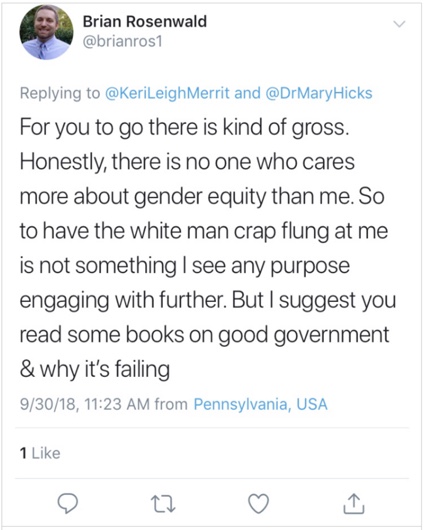
Three days. It had been three days since Dr. Ford had testified before the Senate Judiciary Committee. It had been three days since Kavanaugh showed a sliver of the person his accusers told us he was. It had been three days since Republicans said, in effect, “We believe you Dr. Ford, and we don’t care.” And here was a scholar calling the comments of a female scholar “gross.” Here was a scholar who called a legitimate discussion of white male privilege in this country “crap,” and refused to engage in any discussion of it. Here was a scholar who was mansplaining to a woman how much he respected women while telling her she needed to go do some reading.
I was left aghast. And later that day I made the choice to voice my opinion. I called Dr. Rosenwald out on Twitter. I was not really expecting much fanfare, or for people to actually see my post. What I didn’t expect, though, was for Dr. Rosenwald, who is one of three editors on the Washington Post’s Made by History page, to reply to my tweets.
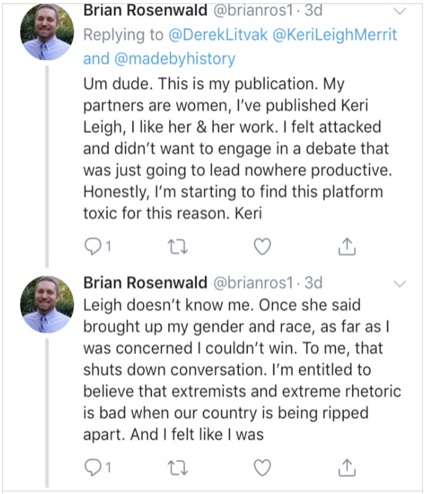
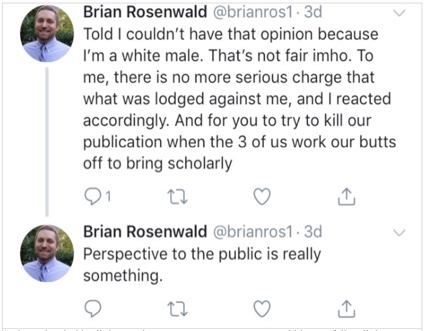
So let us break this all down. First, a note on tone: Dr. Rosenwald knows full well that I am a graduate student. He knows this, because, as I said in my tweets, I recently had an Op-Ed published in the Made by History page he edits. And, to be frank, I cannot separate that knowledge from the insulting tone that proliferate his responses to me.
Second, let me address Dr. Rosenwald’s statements on his working with and supporting the work of female scholars. I don’t care. Dr. Rosenwald’s personal or professional relationship with women is beside the point. His comments toward Dr. Merritt were completely wrong, and he owes her a sincere public apology.
Comments such as the ones Dr. Rosenwald made, as I said in my tweets, have real world consequences. Even if they are made in the heat of the moment, even if they do not represent who we are, our actions have consequences. And we must own that. When we use our privilege in negative ways we must attempt to rectify what we have done.
This is policing our side. This is checking our privilege. This is an issue of how we treat our female peers. It did not start, nor will it end, with Dr. Rosenwald. But that does not excuse his conduct. This is about the larger culture, which allows white men to bemoan a loss of civility, especially by women or people of color, but throw their own rules out the window once they feel “attacked.” And if these last weeks have shown us anything, it is that this behavior is indicative of a culture of entitlement.
And so, I now renew my previous call for Dr. Rosenwald to issue a sincere public apology to Dr. Merritt, and now me. My own role in this is second to the women around me. I went into Dr. Rosenwald’s comments to me because they are an extension of the ones he made to Dr. Merritt and are based on the same privilege he apparently does not like being brought up.
I sincerely hope that my colleagues will stand beside women in this society, whether they be scholars or not, and demand action.